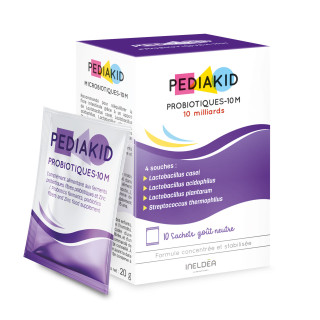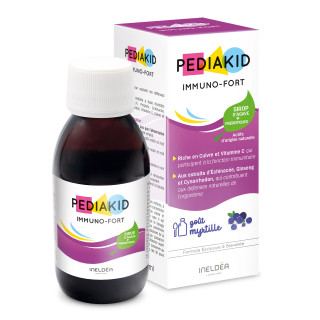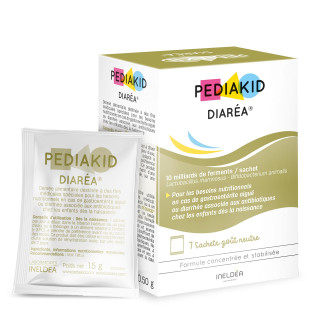Your baby has gastroenteritis for the first time? This can be worrying and even frightening for new parents. A diarrhoea episode in a baby can be scary. But don’t worry, gastroenteritis is one of the most common digestive problems in infants under the age of two years. In most cases, gastroenteritis is not harmful.
The most important thing is to know how to recognise and treat it as quickly as possible and, in particular, to know what measures to take to stop diarrhoea in an infant as this can lead to dehydration. In this article, you will get the answers to all the questions you have about gastroenteritis in babies.
WHAT ARE THE CAUSES OF GASTROENTERITIS IN BABIES ?
Gastroenteritis is an inflammation of the digestive tract, in particular of the stomach and intestines, and has many origins. It can be caused by a germ or bacterium but gastroenteritis is usually viral in origin. In infants, the virus is usually of the rotavirus type, although enteroviruses and adenoviruses can also be the cause.
But the most important point to be aware of is that in its viral form, gastroenteritis can be extremely contagious. This is why in some cases gastroenteritis in a baby follows contact with an already contaminated baby.
However, gastroenteritis in a baby can also originate from food poisoning via bacteria of the Escherichia coli or Salmonella type present in baby food.
The main complication that can arise from gastroenteritis, particularly in children under the age of two years, is dehydration. It is therefore important to learn how to quickly recognise the symptoms of gastroenteritis in babies.
GASTROENTERITIS IN INFANTS: SYMPTOMS
The main symptoms of gastroenteritis in babies are primarily digestive. The first symptom to look out for is diarrhoea; in other words, softer and more frequent stool than usual (2 to 3 fluid stools in a few hours). This diarrhoea is often followed by:
- abdominal cramps or stomach ache
- nausea and vomiting
- fatigue, loss of appetite
- and fever.
It is usually very easy to spot gastroenteritis in a baby. One just needs to pay attention to the symptoms mentioned.
HOW TO RECOGNISE DEHYDRATION ?
Vomiting and diarrhoea lead to the elimination of large amounts of fluid and this can cause dehydration. The risk is higher in infants because they lose not only water but also mineral salts vital for the body to work such as potassium, sodium, chlorine… and this can quickly become a matter of concern.
This is why you as a parent need to look out for the signs of dehydration:
- The eyes have dark circles or are sunken into the orbits
- The fontanel (soft spot) on the baby’s head is hollow
- The baby’s tongue is dry
- There is a persistent fold in the stomach skin if it is pressed.
- The amount of urine, saliva and tears continues to decrease
- The baby’s urine is a dark colour
- The baby is sleepy, tired and generally weak.
Where there is considerable dehydration, there is an even greater reduction in the amount of urine, and even an absence of urine for 6 to 8 hours. Please note that dehydration is one of the main reasons for hospitalisation in children under the age of two years in developed countries. It is therefore important to take the necessary measures to avoid dehydration when a baby shows signs of gastroenteritis.
HOW TO PREVENT DEHYDRATION ?
In the case of vomiting and diarrhoea in infants, dehydration can happen in the space of just a few hours. It is therefore important to get into the habit of weighing your baby at regular intervals. Weight loss should in no case exceed 5% of the baby’s normal weight.
It is also important to monitor your baby’s behaviour. If he or she seems to be getting weaker, cries intermittently without the production of any tears or is simply not quite their normal self, it is advisable to call your doctor.
GOOD PRACTICES FOR MANAGING YOUR BABY’S GASTROENTERITIS
One of the first things that should be done when you notice symptoms of gastroenteritis in your baby is to speak to your doctor. Next, continue to hydrate and feed the baby with breastmilk or usual milk. In the case of diarrhoea and vomiting, it is recommended that You divide up meals to avoid the baby refusing to eat. The baby should therefore be fed small amounts but more frequently.
How do you hydrate an infant with gastroenteritis ?
It is advisable to rehydrate the baby on a regular basis in order to prevent dehydration. Oral rehydration solutions (ORS) are excellent because they contain water, carbohydrates and mineral salts.
Due to their sweet-and-sour flavour, these drinks are accepted more readily by infants. Broths are also a good idea.
What food should a baby be given in the case of gastroenteritis ?
If the baby is still being fed with milk, do not change this. Carry on giving the baby its usual milk but still on the basis of divided into small amounts. If, however, your baby has already started eating different foods, think of giving him or her foods that can slow down, or even stop, diarrhoea such as potatoes, carrots, apple puree, or bananas.
Benefits of lactic ferments to soothe diarrhoea
In the event of diarrhoea, lactic ferments can be excellent options to soothe the infant. These are live microorganisms that are part of the probiotic family.
Many studies have shown that these lactic ferments may contribute to reducing the severity and duration of infant diarrhoea. It’s simple: diarrhoea is often a sign of an imbalance in the intestinal microbiome and therefore indicates a decrease in the good bacteria which give way to dangerous bacteria.
The bacteria found in these lactic ferments, which are Lactobacillus rhamnosus and Bifidobacterium animalis subsp lactis in new-borns, destroy pathogenic bacteria and fight inflammation.
Additionally, these lactic ferments contribute to enriching the intestinal flora and this helps prevent other kinds of digestive disorders.
Lactic ferments are found in dairy products, mainly yoghurt but they can also be found in the form of food supplements.
Two probiotic strains in particular, Lactobacillus rhamnosus and Bifidobacterium animalis subsp lactis, are included in PEDIAKID® Diarrhoea, recommended from birth in the case of acute gastroenteritis or diarrhoea associated with antibiotics.
LAST PIECE OF ADVICE FOR GOOD MANAGEMENT OF GASTROENTERITIS IN BABIES
If this is the first time your little one has gastroenteritis, you might panic and follow some methods which might not be very beneficial. So, stay calm and think about all the advice given in this article.
- Hydrate baby with oral rehydration solutions.
- Monitor weight to check for dehydration.
- Do not give baby anti-vomiting or anti-diarrhoea medication. If your baby has a fever, only use paracetamol.
- If your baby has at least three stools in just a few hours, you must absolutely see a doctor. This is also true if baby is no better after 24 hours.




